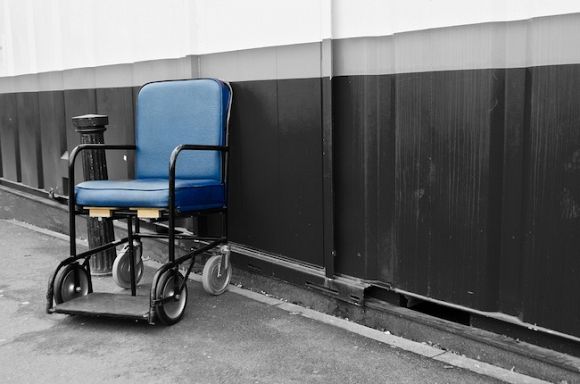The government's human services department is in desperate need of reform after struggling to assist a nation in crisis, writes Fi Peel.
The gift of the new Labor Government appears to be a driving desire to right the wrongs. From the Climate Change Bill to appointing a Minister for Mental Health to fixing our National Disability Insurance Scheme (NDIS), there is now a flurry of activity within the hallowed halls of the House.
All of these issues are deeply meaningful but there is one issue that affects over half of the Australian population that continues to remain the elephant in the room. This elephant bears the name Services Australia.
There are currently eight Joint Standing Committees underway, including the JSC on the NDIS. As a lived experience representative and NDIS participant asked to provide feedback regarding the Parliamentary Inquiry into the Capability and Culture of the NDIA, it has struck me as jarring that all eyes are on a scheme that currently affects 534,655, or 2.1 per cent, of Australians and yet the capability and culture of Services Australia continues to skirt under the radar.
For a forward-facing point of service delivery that deals with 15,777,572, or 62 per cent, of Australians receiving some form of government income support, as of June 2022, long wait times, inexperienced and even combative call-centre operators are all frustrations that many Australians share, particularly since the rise of the pandemic.
Centrelink offices around the country dissuaded face-to-face attendance at storefronts before finally closing offices, leaving customers stranded. Everyone with a customer reference was continually pushed online in deference to calling, irrespective of the intersectional impacts of the digital divide.
As tensions mounted, how was it possible to ignore the threat of disconnection after waiting for more than an hour to the sounds of the recorded message on loop, reminding those trapped in the time warp that Services Australia staff deserved to be treated with courtesy and respect? As someone who intimately understands how any emotionally charged scenario is escalated and knows how to skillfully de-escalate it after the fact, my work always focuses on removing the tinder box of elements that might inadvertently spark the flame and therefore remove the need to de-escalate the rising threat for both parties.
While this work is becoming more and more commonplace in mental health service settings, its rational approach is something that seems to have eluded the wisdom of Services Australia’s media and comms team when considering the need to script such a defensive predicator into the mindset of a country in crisis.
With states and territories now declaring an end to the COVID public health emergency and with many returning to face-to-face workplaces and engagement, the social scars of job losses, rising domestic violence rates, risk of homelessness scenarios and many other told and untold intersecting impacts of pandemic pressure remain. This is something that Human Services call centre staff members are also intimately aware of.
What remains, however, is trauma pitched against vicarious trauma and the results are devastating for those who are still forced to wait on hold for more than an hour only to have the issue that they cannot legitimately deal with through the myGov portal or Centrelink Express app, resolved on an average of 6 minutes and 2 seconds in 2020-2021 down from 14 minutes and 11 seconds from the year before.
When I consider my own telephony interactions with Services Australia over the time in which this data was collected, the theme of the “why” remains unchanged, as represented in a phone interaction just last week:
ME: I’m calling to find out more about why my Family Tax Benefit was suddenly cut with no warning?
SERVICES AUSTRALIA: It looks like you received a letter stating that your 16-year-old child has applied for their own payment.
ME: Yes, that is correct, they have applied for Disability Support Pension.
SERVICES AUSTRALIA: Well, that’s why, then.
ME: But we have been told that it will take up to six months for the DSP to be assessed. The FTB that has been suddenly pulled without warning represents a week of rent. I am a contract worker which allows me to work from home to fulfill the requirements of my Carers Pension. If there are no contract, we now cannot pay our rent.
SERVICES AUSTRALIA: Yes, but once approved for DSP, there will be a back payment for the six months.
ME: How is that supposed to help me pay the rent to keep a roof over our heads in the meantime?
SERVICES AUSTRALIA: Well, if the application is…
ME: This was supposed to help my teenager develop some of their own financial freedom, not put us at risk of homelessness.
SERVICES AUSTRALIA: I’m sorry, but this is how the legislation works. We can’t pay you for the next six months and also provide a back payment which is required by law.
If the hands of Service Australia officers are tied by structural inequities that give rise to human distress, then the legislation needs to be revisited. If outsourced call centre contractors do not take time to adequately train their staff in trauma-informed approaches to handling call after call of confusion and activated threat, then targeted training is mandated.
If call centre operators are so emotionally exhausted by handling calls that result in either completely emotionally distancing from the needs of the humans on the other end of the line who see the call centre role as representative of the inequities of structural injustice or conversely, if operators are actively aggressive at the justifiable push-back, then a complete capability and cultural review of this organisational structure is imperative.
Fi Peel (they/them) works independently as a lived-experience mental health recovery specialist. You can follow Fi on Twitter @fi_peel.
 This work is licensed under a Creative Commons Attribution-NonCommercial-NoDerivs 3.0 Australia License
This work is licensed under a Creative Commons Attribution-NonCommercial-NoDerivs 3.0 Australia License
Support independent journalism Subscribe to IA.














